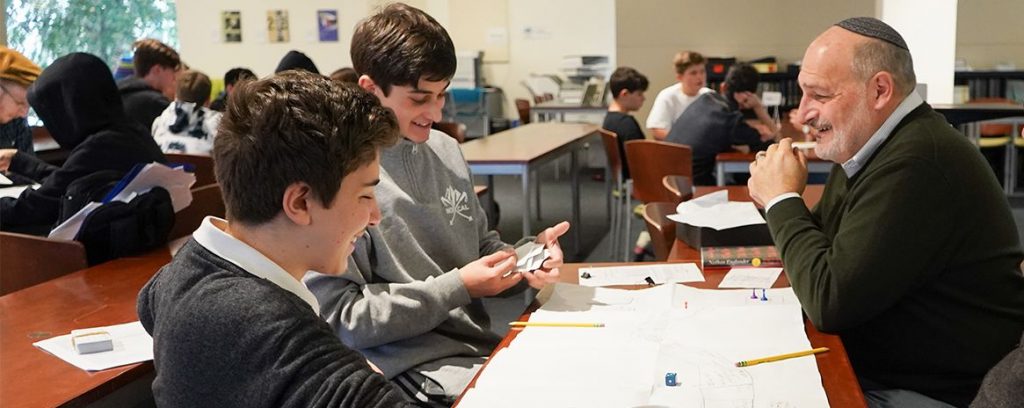Don’t Skip a Bad Story
By Raizy Lichtenstein, Jewish Studies Teacher
Vayishlach, this week’s Torah portion, contains what Robert Alter describes as a “miscellaneous overview of Jacob’s later career” (Introduction to Genesis 35). It includes Jacob’s return to the land of Israel after 20 years abroad in Haran, during which time he has married four women and fathered thirteen named children, twelve of whom will become the tribes of Israel. The thirteenth is Dina, his only daughter, whose singular claim to fame in this week’s Torah potion is that her brothers Simeon and Levi destroy a town and its inhabitants to avenge her abduction and rape at the hands of its tribal leader, Shechem (Genesis 34).
I tell my ninth grade Jewish Studies students quite often that the Torah’s narratives are stories for adults. As educators or parents, we often try to sanitize or simply skip the less savory biblical stories when we teach them to children, with the unfortunate effect that many people who haven’t had a chance to study the Torah as teens or adults remember the Torah’s narrative portions as child-friendly and cute. But there’s nothing cute about the stories in Vayishlach. Jacob’s reaction to his vengeful sons’ destruction of the city of Shechem in response the rape of Dina is a rebuke for endangering the family:
וַיֹּ֨אמֶר יַעֲקֹ֜ב אֶל־שִׁמְע֣וֹן וְאֶל־לֵוִי֮ עֲכַרְתֶּ֣ם אֹתִי֒ לְהַבְאִישֵׁ֙נִי֙ בְּיֹשֵׁ֣ב הָאָ֔רֶץ בַּֽכְּנַעֲנִ֖י וּבַפְּרִזִּ֑י וַאֲנִי֙ מְתֵ֣י מִסְפָּ֔ר וְנֶאֶסְפ֤וּ עָלַי֙ וְהִכּ֔וּנִי וְנִשְׁמַדְתִּ֖י אֲנִ֥י וּבֵיתִֽי׃
וַיֹּאמְר֑וּ הַכְזוֹנָ֕ה יַעֲשֶׂ֖ה אֶת־אֲחוֹתֵֽנוּ׃
You have stirred up trouble for me, making me stink among the land’s inhabitants, among Canaanite and Perizzite, when I am a handful of men. If they gather against me and destroy me, I shall be destroyed, I and my household.”
Simon and Levi counter with a challenge: “Like a whore shall our sister be treated?” (Genesis 34:28-31, Translation by Robert Alter)
A crime precipitates a war and ends in an argument. This is the kind of story we educators and parents might prefer to skip. After all, there’s a “better,” battle narrative earlier in this Torah portion. Jacob fends off the attack of an angel and emerges victorious, earning the name Israel: “For you have striven with God and men, and won out” (Genesis 32:29). People love that story, especially the symbolic message about fighting with the Divine; the value of questioning, arguing and engaging with God’s word.
Our narrative, in contrast, is loaded with the painful, unsettled arguments between humans who struggle to agree on what course of action is better in an impossible situation. A heinous crime has been committed, and a vicious counterattack has ensued. Jacob, the elder, considers the wider ramifications of this attack on the family’s safety and future (Will you make us “stink” in the eyes of our neighbors? Will they attack and destroy us?); Simon and Levi, the younger generation, fume about the horror that instigated the destruction, and the dangers of inaction (Shall our sister be treated “like a whore?”). And we are left, as the Torah ends the chapter, in the agony of these painful, unresolved questions.
Perhaps the chapter ends here because there is no way to resolve their argument; not every battle can be won. In fact, the more challenging and complicated a circumstance is, the less likely there is to be a definitive answer that can solve all of its attendant problems. Sometimes, the Torah suggests, we’re called upon simply to hear both sides and notice the animating arguments that lie at the heart of opposing approaches, messy and incomplete as they may be. We may not be able to definitively solve every problem, but we can pause and try to recognize each other’s humanity, each other’s logic, and each other’s striving. Most of us are trying to do our best with the tools we’ve been given in a constantly shifting world.
At JCHS, every student has hundreds of opportunities to engage in the powerful, character-building, and challenging experience of sharing and hearing ideas that are unlike their own. There are moments when students agree that something is right or wrong with absolute clarity: moments of fighting with the angel and winning. But there are other times when students lay claim to opposing and seemingly irreconcilable opinions, and their rationales, like those of Jacob and his sons, can be layered, stemming from differences of all sorts, including age, experience, and worldview. Our students step up daily to the invitation to stop and listen to each other with caring and curiosity. Their commitment to flex, hold, relate, and understand while still honoring and upholding their core values and beliefs can serve as an inspiration to us all.









